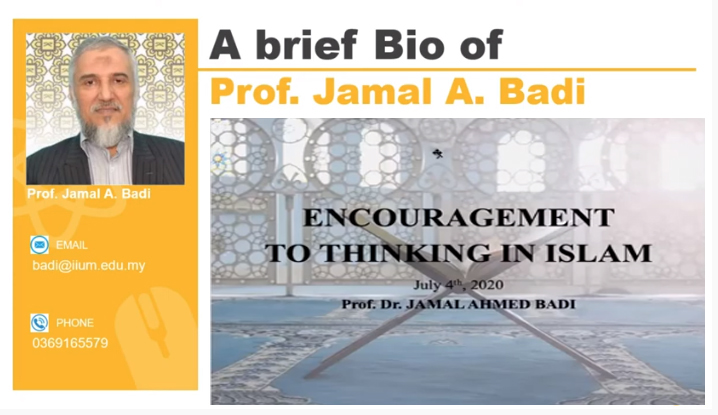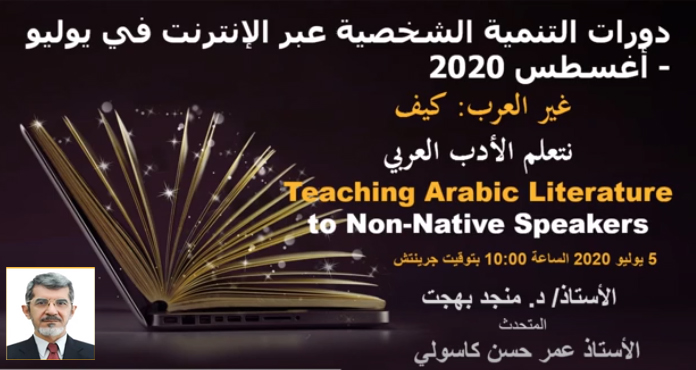IIIT-IOS organise Three-Day Personality Development Course via Zoom
IIIT-IOS organise Three-Day Personality Development Course via Zoom

A three-day personality development course via zoom was jointly organised by the International Institute of Islamic thought (IIIT) and the Institute of Objective Studies from July 3 to 5, 2020. The first-day speaker was Prof. Dawood Abdulmalek Yahya Al-Hidabi, a Yemeni researcher, founder and former President, University of Science and Technology, Sana’a, who spoke on ‘Muslim Family Quality Standards’. The session was hosted by Nasur. In his lecture, Prof. Dawood, stressed that a family member should have a feeling of sacrifice for others. He should also cooperate with others in matters that were crucial for them. This included other people, other states and other religions. One must not only display it but also have love for others in true sense of the term.
He said that support to neighbours and friends was essential for cementing the bonds of cordial relationship among different communities. Recreation and entertainment positively contributed to the enhancement of the quality of family standards. Referring to the management and generation of finances, he said that the help of society should be sought in such matters. It must also be ensured that the needy families were provided help in order that they could survive and flourish. He noted that basic needs of the family must be fulfilled. Similarly, all family matters should be discussed within the family and each one among the members was morally bound to take the responsibility to address the issues together.
Calling for right decisions at the right time, he said that the mosque should be made the nucleus and the community members must regularly attend religious gatherings there. Commenting on the use of internet, he noted that it was beneficial in more ways than one. But care must be taken that only the positives were used and the negatives discarded. Besides, a fixed time should be decided to use the internet. He suggested that the ideal time to use the internet was after salah. With this, we could become a role-model for our children. Husband and wife working together should be made collective culture of togetherness, he stressed.
Prof. Dawood observed that emulating and imitating others was a part of good practices and praying on time and reading the Qur’an formed the basic tenets of Islam. These practices inspired children to emulate elders. He emphasised that a meeting of children of the locality should often be called to discuss the Sirah. Sometimes the different philosophies of spouses created problems, but a solution to this tangle could be found by adopting an integrated approach. The role of Imaan came into play when differences between spouses on religious beliefs occurred. This might happen when one of them was religious and the other was secular. He also dwelt briefly on the influence of globalisation on the Muslim Ummah.
Underlining the importance of education, he said that more and more attention should be paid to the education of children. As a part of the programme educational programmes for children should be organised for their over-all development. Equal importance should be attached to both formal and informal education. He said that both parents needed to be trained. Since prevention was better than cure, every effort should be made to keep children busy. This would offer them a chance to rectify problems that might emerge during the course, he maintained.
Prof. Dawood said that Islam being a universal religion, both Muslims and non-Muslims could follow it for their good in this mundane world. We have belief in Akhirah and thus our actions should reflect our concern for re-assembling on Day of Judgment. He observed that in the West, family as an institution was vanishing and it was our duty to preserve it. He stressed the need for creating community centres where people should visit and participate in counseling sessions. He also suggested that every house should develop a digital library in order to understand and dispel any misconceptions about Islam and Muslims.
Similarly, micro-finance programmes should be encouraged for entrepreneurship development. These should be short-duration programmes of three months. Education of children should start at an early and they should be made to inculcate family values. These included respect and obedience to parents and teachers who were role models for children. He pleaded for inter-faith dialogue for better understanding of Islamic teachings. These were the opportunities to showcase the tenets of Islam, its compassion and mercifulness. It also helped spread the message of Islam. He referred to a similar dialogue programme place in Italy two months ago.
Second day (July 4, 2020)

The second lecture was delivered by Dr. Jamal Ahmed Bashier Badi, Professor of Fundamental and Interdisciplinary Studies, International Islamic University Malaysia on ‘Encouragement to Thinking in Islam.’ In his lecture, he explained the Qur’anic usage of the concept tafakkur (Thinking), and said that it was the concept of ibadah and endeavour. If practicing tafakkur was necessary, collective thinking of Islam should be institutionalised. Referring to the review and evaluation of academic work by two to three persons, he said that these people should be allowed to share their ideas. This would be called collective thinking. Ijtihad at a higher level was collective thinking and collective thinking was in fact the collective ijtihad, a beauty of Islam. The importance of thinking could be understood by its use in the Quran, which has used as many as 31 terms related to thinking. They are at different levels of thinking, involving different aspects, he remarked.
Discussing the status of thinking in Islam, Prof. Badi said that it was related to al-aql–intellectual ability of thinking. He held that thinking is a hallmark of Islam. A universal attribute, it particularly emphasized in Islam. He said that thinking should be positive and creative. If it was negative, if could lead to catastrophic effects like production of weapons of mass destruction (WMD). Research would be positive if it is to beneficial for humanity. Explaining the purpose of creation in the Qur’an, he said that it focused on worship of Allah and the establishment of civilisation. Quoting Hadith, he noted that it asked the faithful with some experience to help others. Hadith appreciated the creativity that mitigated the suffering of humanity. Islam promotes and motivates such creativity. All virtuous actions would be rewarded by Allah in return. In Islamic perception, there is no difference between male and female as their duties are more or less the same and complementary to each other. He said that the faithful were commanded to think and deliberate.
Commenting on styles of thinking Prof. Badi said that the Qur’an used 50 different styles of thinking. He called for exploring and discovering social divineness. While defining knowledge, he quoted Imam Shafa’i, who said that knowledge could not be memorised. That was the reason why emphasis was laid on originality and genuineness. He also referred to a book titled ‘Valued-based Thinking’, written about one and a half decade ago. He said that critical thinking dominated the scene for a long time leading to stagnation. Making out a case for integrated knowledge, he said that it should not be a segregated one. IIIT was doing a laudable job in integrated knowledge-sharing. Using specific terminology in teaching played a decisive role and teachers as well students should be encouraged to be creative and innovative. There was a difference between universal divine law and social divine law. The Qur’an had several social divine laws and universal divine laws. He added that Islam strengthened the spirit of creativity.
Third and the last day (July 5, 2020)

The third and the last day was marked by a lecture by Prof Dr. Munjid Bahjat, Professor, Department of Arabic Language, International Islamic University, Malaysia on ‘Teaching Arabic literature to non-Native Speakers’. He explained the niceties of the teaching of Arabic language and literature to non-native users of Arabic.
Go Back